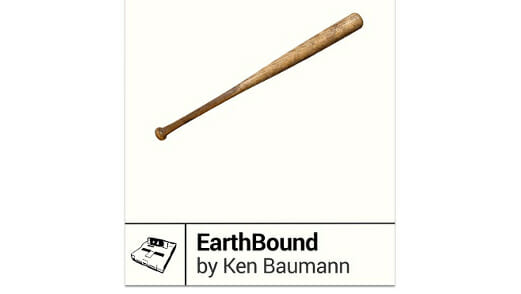EarthBound by Ken Baumann

I have complex feelings about Ken Baumann’s EarthBound, the first book out from Boss Fight Books’ new series of short critical works on videogames done in the style of the 33 ? series. The core concept of the book is that Baumann played the much-loved Super Nintendo game EarthBound as a child, and now that he is an adult, a critical reflection on a game that is at least partially about growing up and experiencing strange things in the world is in order. This conceit anchors the book, structuring it in such a way that the information Baumann provides about EarthBound is wrapped up in frequent references to his own life, his relationships, the time that has passed between the release of the game and now, the choices he has made professionally, and a cornucopia of other information that need not be included in a laundry list for the sake of conserving space.
The book weaves a line between an object-focused study of EarthBound and a memoir about Baumann, and this line often hooks to the right or the left. The videogame EarthBound only exists as a touchstone for eliciting information about Baumann’s life, and sections that directly speak to the game are few and far between. That said, those portions of the book shine; Baumann’s descriptions of the characters in the game and the world they live in are evocative and really do render the strangeness of that game into graspable language. Additionally, the long-form descriptions of his play experience, especially a trial of killing specific enemies in order to collect the rare Sword of Kings, rock back and forth between a good story and a fidelity of what it is like to play this fan-favorite oddity.
On the other hand, the book’s frequent turns for the self-indulgent hamper it. For every interesting anecdote about the game, we are treated to numerous factoids about Baumann’s life that do not add anything significant to the work. I want to be clear that I’m not complaining that the book strays from its analysis of the game, but rather that the things that Baumann seems to believe might be significant or endearing to me as a reader instead place a gulf between the two of us. Some of the more egregious examples are a section about his recent acceptance to St. John’s College in Santa Fe, his half-hearted and half-apologetic admission of making $500,000 a year as an eighteen year old, a page-long anecdote about Google searching a logo, and a quick story about how his upbringing made him more polite than some older, maybe-more-wealthy man.
Despite these passages—and there are more than I have listed there—I have complex feelings about the book overall. While I think the self-indulgence of the book, and its style in general, is perhaps too deeply indebted to post-1970s American literary fiction and its predictable modes of expression, I can’t discount how well Baumann works within that genre. As a writer, he is incredibly gifted at establishing a rhythm and keeping to it, and as a result of that, I came out of the book with a positive spin, despite the fact that I did not enjoy large swathes of it. In other words, EarthBound has great book feel.
-

-

-

-

-

-

-

-

-

-

-

-

-

-

-

-

-

-

-

-

-

-

-

-

-

-

-

-

-

-

-

-

-

-

-

-

-

-

-

-








































